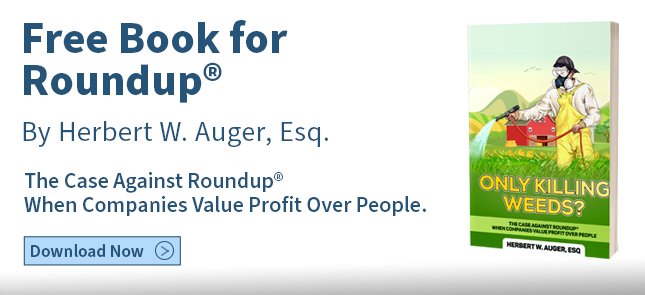Roundup is one of the most popular “weed killers” in the world. However, recent studies and lawsuits show that its main ingredient, glyphosate, is a carcinogen, meaning it causes cancer. Specifically, glyphosate has been linked to non-Hodgkin’s lymphoma. People who have been heavily exposed to Roundup, especially those who use the herbicide as a part of their job, may have developed non-Hodgkin’s lymphoma and other cancers. Anyone who falls into this category may be able to file a Roundup cancer lawsuit, either as an individual or as part of a class action.

At Auger & Auger Accident and Injury Lawyers, our Roundup lawsuit attorneys in Greeneville are ready to evaluate your case and explain all of your legal options. We work closely with people in your situation to help you determine if it would be more beneficial for you to join a large group of people filing a lawsuit against the manufacturers of Roundup (a.k.a. a class action lawsuit), or if it would be better to file a lawsuit with you as the sole plaintiff.
If you or your loved one were repeatedly exposed to Roundup and later developed non-Hodgkin’s lymphoma, you deserve to know whether you have the right to file a lawsuit. You don’t have to face this difficult situation alone. Our team has decades of combined experience and knowledge that can help you win your case. And if we don’t win, we don’t get paid.
So give us a call at (864) 991-3532 or contact us online for a free, no-obligation consultation with one of our lawyers today.
The Connection Between Roundup and Cancer
Roundup, which is the chemical glyphosate, was first created and patented by the company Monsanto in 1974. It was believed to be a miracle herbicide, since it was cheap and effective, and had “low toxicity profile” compared to more infamous herbicides like DDT. It soon became the go-to weed killer for large farming operations and household gardeners alike.
In the late 1990s, genetically-modified crops that were resistant to glyphosate launched sales of Roundup to new heights. Roundup was considered “the most successful herbicide in history” because of these glyphosate-resistant crops. These crops are called “Roundup Ready,” and make up an estimated 90 percent of all genetically-modified crops, and over 1 billion pounds of Roundup are used annually across the globe.
However, as more research and studies were conducted, it soon became apparent that Roundup wasn’t the miracle herbicide it was thought to be. In one study, glyphosate was found in over a third of all sampled waterways in the Midwest. It has also been found in many popular foods, like cereal and granola bars. To make matters worse, it was also found in organic foods, which are supposed to be herbicide-free. Eventually, some farmers and landscapers who were heavily exposed to Roundup developed cancer, and a possible cause-and-effect relationship was hypothesized.
In 2015, the International Agency for Research on Cancer evaluated these concerns. They concluded that there was sufficient evidence to link Roundup to cancer in humans and animals. They further classified glyphosate as “probably carcinogenic to humans.”
Previous Roundup Cancer Lawsuits
One of the first successful Roundup lawsuits was filed on behalf of Dewayne “Lee” Johnson. Johnson worked as a pest control manager and groundskeeper before he fell ill. He was eventually diagnosed with non-Hodgkin’s lymphoma in 2014, and it was concluded that Roundup was the cause of his illness.
This conclusion was reached when it was revealed that Monsanto actively deceived the public by fighting to prevent studies of glyphosate’s carcinogenic properties from being released. They did so by co-sponsoring research that was favorable to Roundup and even considered ghostwriting a study that showed glyphosate was not dangerous.
These actions proved Monsanto (and its parent company Bayer) was aware of the foreseeable risks of their herbicide but took no action to protect the public. Johnson was originally awarded over $39 million in compensatory damages and $250 million in punitive damages. However, his total award was reduced to $78 million. Another similar case resulted in a $2 billion verdict for a couple, but that award was later reduced to around $250 million.
It’s expected that many similar lawsuits will be brought forward soon. A class-action lawsuit has also been created, which is more likely to result in compensation for victims than an individual Monsanto Roundup lawsuit.
Who’s at the Most Risk for Developing Cancer Due to Roundup?
Anyone who has used Roundup or otherwise been exposed to glyphosate on a regular basis may be at risk for developing non-Hodgkin’s lymphoma and other cancers. Those at the highest risk include:
- Professional gardeners
- Landscapers
- Groundskeepers
- Farmers
In addition, people who live near farms or other locations that use a large number of herbicides may also be at risk for glyphosate exposure due to water runoff and “herbicide drift” caused by winds. In rare instances, individuals in Greenville who have been exposed to glyphosate through consumer uses, such as controlling weeds in their garden, may also have an increased risk of cancer.
However, it’s not just Roundup that can lead to issues. There are many different herbicides that contain glyphosate, the cancer-causing ingredient in Roundup. These other herbicides include, but aren’t limited to:
- Roundup
- Enforcer
- Kleeraway
- Bonide KleenUp
- Bayer Advanced DuraZone
- Spectracide
- Hi-Yield Killzall
- Rodeo
Eligibility for the Class Action Monsanto Roundup Lawsuit
The use of glyphosate, especially Roundup, has most commonly been linked with a common type of cancer called non-Hodgkin’s lymphoma. This is a cancer of the lymph nodes, a part of the body system that fights infections. Lymphoma has been known to rapidly spread throughout the body, causing cancers in other organs and tissues.
Types of non-Hodgkin’s lymphoma that can be caused by Roundup include:
- Follicular lymphoma
- Hairy cell leukemia
- Chronic lymphocytic leukemia
- Mantle cell lymphoma
- Diffuse large B-cell lymphoma
If you develop lymphoma, you may experience fatigue, weight loss, night sweats, shortness of breath, swollen but painless lymph nodes, and other symptoms. If you do experience these symptoms, you should visit your doctor immediately. If they do diagnose you with non-Hodgkin’s lymphoma and you have a history of using Roundup or similar herbicides, contact an experienced lawyer to discuss all of your legal options.
At Auger & Auger, our Roundup lawsuit lawyers can help you file an individual lawsuit against Monsanto and Bayer, and we can help you figure out if you qualify to participate in a class-action lawsuit. If we’re successful, we can help you recover compensation for your medical bills, lost wages and earning capacity, your pain and suffering, and much more.
Our attorneys are dedicated to making you get the compensation you deserve, first and foremost. That’s why we never charge any upfront fees, and we only get paid if we win your case. Give us a call at (864) 991-3532 or contact us online for a free, no-obligation consultation with one of our Greenville Monsanto Roundup lawsuit lawyers today.















